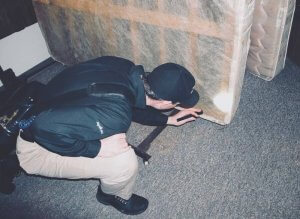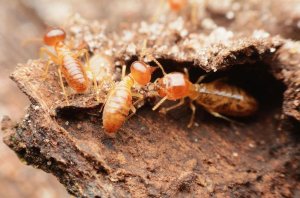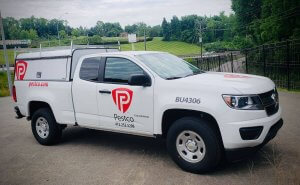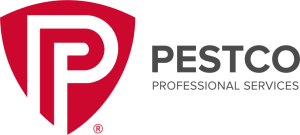Are the costs for pest control services deductible from your personal or business tax? If you live in Pennsylvania, the answer is yes in a number of cases. Read on to discover what the Pennsylvania Codes say about pest control deductions.
Statesman, orator and prolific inventor, Benjamin Franklin, once said that “in this world, nothing can be said to be certain, except death and taxes.”
He was correct as he was in most things, and although many have tried, ultimately there is no avoiding the fact that we all must live, die, pay takes, and hopefully, have some fun in between.
The question is: Are there deductions the average home owner or business person may not know about that could lessen their financial burden and obligation? The answer is yes.
The need for pest-control and pest-management is a fact of life, and is vitally important because rodents and insects are vectors of serious diseases, infest kitchens, bedrooms and yards and bite home-owners and their pets.

Eliminating an infestation by utilizing the expertise of an outside company, such as our teams at Pestco, can be both necessary and costly for a home, office, rental property or commercial work space.
Over the counter products provide superficial solutions, but they cannot permanently eliminate a pest infestation.
This is because their sources (nests) are usually not visible to the naked eye and require much more power, know-how and reach than OTC products can offer.
Pest Control As Ordinary and Necessary Expenses
According to Pennsylvania Code (1 Pa. Code § 17.5.), “an ordinary expense is one that is common and accepted within a specific trade or business. A necessary expense is one that is helpful and appropriate to a specific industry, but not necessarily indispensable to be considered such. Cited by 22 Pa. Code § 4.83, integrated pest management includes a variety of pest control methods that include repairs, traps, bait, poison, etc applied to eliminate pests.”
More specifically, in terms of deductible pest-control services, the following are examples of those that apply.
Disinfecting
This concerns the performance of services to a particular property, which destroys or sanitizes harmful microorganisms, including deodorizing. Some examples of taxable disinfecting or pest control services include:
1. Inspection or certification provided in conjunction with disinfecting, deodorizing, exterminating, fumigating or pest control services whether or not they are billed separately.
2. Service policy fees or renewals for disinfecting, deodorizing, exterminating, fumigating or pest control services.
3. Deodorizing and disinfecting buildings, restrooms, washrooms or other areas in a building.
4. Disinfecting hot tubs, food processing equipment, clothing, medical instruments, trucks, containers or other property.
5. Pest proofing.
6. Disinfecting, deodorizing, exterminating, fumigating or pest control services purchased by persons engaged in manufacturing, processing, rendering public utilities services, mining, printing or photography.
Fumigation
These are specific property services that disinfect or destroy pests through the use of smoke, gas, gaseous chemicals or other fumigants.
General Pest Control
These services to trees, shrubs, animals, buildings and other property neutralize, fumigate, exterminate, trap, recover or prevent pest ingress.

The following represent examples of services which do not fall into the category of disinfection or pest-control:
1. Inspection or certification that is not provided in tandem with disinfecting, fumigating, deodorizing or other pest control services
2. Herbicides or fungicides applied to property other than lawns
3. Integrated pest management programs that do not include other pest control services
Exclusions
There are two exemptions to the rule concerning disinfection or pest-control services. They are:
1. Disinfecting or pest control services that are purchased by qualified charitable organizations, volunteer fire companies, religious organizations and non-profit educational institutions, except if they are used in an unrelated trade or business.
Services are also exempt if they are purchased by the Federal government or its instrumentalities; or the Commonwealth, its instrumentalities or subdivisions including public school districts. The manufacturing, mining, processing or the public utility exclusion does not apply.
2. Those companies that sell disinfecting or pest control services may claim a resale exemption upon their purchase of tangible personal property, which is transferred to the purchaser or a third party in the performance of its disinfecting or pest control services.
The vendor may also purchase disinfecting or pest control services from another provider and then resell to its customer.
The vendor may not claim the resale exemption upon its purchase of administrative supplies or the purchase of other taxable services which it may use in the performance of disinfecting or pest control services.

For business managers, home owners, property renters and those who work in a home office, certain pest-related services, which the IRS refers to as “ordinary and necessary expenses,” can be deducted from personal income tax under the category, maintenance.
For commercial enterprises, pest control is crucial to maintaining a healthy and hygienic environment for both employees and customers.
These expenses can only be applied in the year in which they were paid, even if such services were performed in the previous year.
For owners of property who rent to others, ordinary and necessary expenses are considered those that are required to manage or maintain said property, even if it is vacant as long as it is on the market as an available space.
Besides pest-control, tax deductible services can also include: landscaping; mold removal; interior/exterior painting and piping features.
Pest Control As Direct and Indirect Expenses
Income tax statements break down the profits and losses of a particular business during a specific time frame.
Diverse line items for income and expenses are delineated such as: revenue, cost of goods sold (COGS), and operating expenses.
Expenses or direct costs incurred while manufacturing the main “product” or “service” of the company are considered direct expenses, and they are always indicated on the debit side of a statement. These costs can be allocated to a specific product, department or segment.

Their exact nature may vary widely for enterprises in different industries such as: manufacturing, construction and service companies.
In terms of home offices, direct expenses are those that directly benefit the “office” portion of a particular residence.
A proportionate amount of pest-control costs can be deducted as office indirect expenditures.
For their inclusion on tax statements, when calculating payments, the home owner must include the amount (labor and square footage) that has been spent on the office versus the house.
Indirect expenses relate specifically to goods and services, while direct taxes are charged on income and profits.
They are necessary to keep the business up and running, but they can’t be directly related to the cost of the core revenue-generating products or services.
These deductions refer specifically to those who work in home offices.
They include the pest-control services we perform for both offices and the homes.
Like direct expenses, they can also be different for diverse organizations.
For large companies, they are usually costs that are shared among various segments within a firm.
Examples include: salaries; telephone bills; printing and stationery and legal and accounting costs.
Tax-Deductible Pest-Control Services and Stipulations
Generally, the IRS does not consider maintenance expenditures for termite damage qualifications for a “casualty loss” deduction.
The rule is that such losses must be “sudden, unusual and unexpected,” which can be very difficult (if not impossible) to prove due to the fact that damages are usually not discovered until it is far too late.
Additionally, for Pittsburgh business and home owners who have experienced a termite infestation, salt is rubbed further into their costly wounds by the fact that repair expenditures from sales proceeds to reduce the taxes on profits cannot be deducted either because bills relating to termite repair are considered “maintenance” rather than “capital improvement”costs.

These can include the addition of a new bedroom or a kitchen-remodeling project. They are deductible because they add value to a house.
Why Homeowners And Business Owners Choose Pestco!
We are a five-star, family-owned and operated Quality Pro Certified company that has been in continuous operation for more than seven decades and have long been a respected name associated the most effective, friendly and accredited pest-management and pest-control services throughout Greater Pittsburgh.

Since our inception, we have mushroomed into an industrial leader, offering the best exterminating services, products and solutions that money can buy.
Cost-effective, fully integrated and uncomplicated, our professional services are all performed by expert technicians.
Our main selling point concerning the incorporation of a pest exclusion policy is the fact that it’s much easier and safer for the environment to keep pests out of any space than it is to eradicate an infestation once it takes hold.
Pest exclusion is a first line of defense against infestations.
Our many services are cost-effective, our products 100% sustainable and our solutions are based upon both biology and the natural life cycle of pests.

In Conclusion
So call our teams today and let us help you with any pest control or pest management issues you may have experienced; and do call your accountant tomorrow and refer to their wisdom as to exactly where your pest control costs can be curtailed and considered tax-deductible.
Final thought about taxes: This is too difficult for a mathematician. It takes a philosopher.~Albert Einstein (on filing tax returns)
Photo Credits: Pixabay
NOTE: Pestco Professional Services is not a certified accountant and is not providing tax advice in the above blog. Any reader should consult their personal or business accountant for advice on deducting any pest control-related service from their taxes.
 Over 300 Reviews
Over 300 Reviews 
